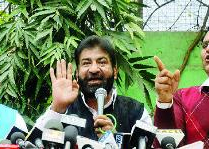 New Delhi, Feb 3: Aam Aadmi Party's expelled MLA Vinod Kumar Binny on Sunday produced the most potent threat yet to the month-old Kejriwal government, when he teamed up with two legislators and said they would withdraw support if the regime did not fulfill its promises in the next 48 hours on slashing power and water bills, women's security and a fair probe into the 2010 Commonwealth Games scams.
New Delhi, Feb 3: Aam Aadmi Party's expelled MLA Vinod Kumar Binny on Sunday produced the most potent threat yet to the month-old Kejriwal government, when he teamed up with two legislators and said they would withdraw support if the regime did not fulfill its promises in the next 48 hours on slashing power and water bills, women's security and a fair probe into the 2010 Commonwealth Games scams.
The rebel Laxmi Nagar MLA shared the podium with veteran Janata Dal (United) MLA Shoaib Iqbal and Independent Rambeer Shokeen, both of whom had voted for the government in the assembly.
AAP has 27 MLAs after Binny's expulsion and runs the government with outside support from eight Congress legislators. If the trio were to vote against the government, it faces the prospect of slipping below the majority mark of 36 in the 70-member House. Binny also claimed to have the support of other two MLAs.
Iqbal, who in past had expressed a desire to join AAP, claimed that the party was losing popularity. "People are no more with the AAP government as it has completely failed to deliver its promises," he said, hinting that he may form a new party. The rebels, when asked to identify the other dissidents, said they would hold another press conference on Monday to announce the names.
"We are not interested in bringing down the government. But we want the government to fulfill its promises. We are giving them 48 hours to deliver. The next course of action will be decided later," he said. Binny had earlier accused AAP of deviating from its poll promises, triggering an ugly bickering in the party. He was sacked earlier this month.
In the list of Binny's demands were a reversal of the hike in surcharge on power, making water consumption up to 700 litres a day free without any riders, a probe into the Commonwealth Games and effective measures for women's security.
After coming to power, AAP had said water up to 20 kilolitre water per month (approximately 666 litres per day) will be free for consumers with functional meters. The government also slashed electricity tariffs by 50% for households that consumed up to 400 units a month. The Delhi Electricity Regulatory Commission last Friday approved a hike in the power purchase cost adjustment surcharge, as sought by the city's private distribution companies.





Comments
Add new comment